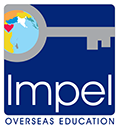
This year’s QS World University Rankings: by Subject evaluates over 1,500 institutions across 54 different subjects, grouped into five faculty (broad subject) areas. Now in its 13th iteration, the ranking evaluates institutions’ academic performance in certain fields, to give students and institution’s insight into a programme’s strengths, as well as what might need to be prioritised to achieve a better study experience.
Notable features of the QS World University Rankings: by Subject 2024 include:
Six of the 10 most improved programmes are hosted by institutions in the Arab Region: Oman, Saudi Arabia, United Arab Emirates, Iran, Qatar and Jordan.
Three new subjects have been evaluated: Data Science, Art History and Marketing.
US institutions lead in an impressive 32 subjects. Among the top-performing institutions, Harvard University ranks first across 14 subjects – two more than last year’s results.
The University of Oxford dominated four of the top 15 subject tables including ‘Anatomy and Physiology’, ‘Anthropology’ and ‘English language and Literature’ – while the University of Cambridge dominated two: ‘Archaeology’ and ‘Modern Languages’.
The H-index (a metric that measures both the science productivity and impact of published work from an institution) ranks Australia fourth among the most impactful research locations worldwide.
Ben Sowter, QS Senior Vice President, said: “This subject ranking is the largest ever and provides an ever-deeper understanding of how rankings success is achieved. Sustained targeted investment and international collaboration are consistently pillars on which progress can be made. Meanwhile, improving relationships with industry correlates with better employment, research, and innovation outcomes.”
Check out the top 10 institutions globally with the leading academic programmes below:
Arts and Humanities
1. Harvard University
2. University of Cambridge
3. University of Oxford
4. Stanford University
5. University of California, Berkeley (UCB)
6. Yale University
7= Columbia University
7= New York University (NYU)
9. University of California, Los Angeles (UCLA)
10. The University of Edinburgh
Engineering and Technology
1. Massachusetts Institute of Technology (MIT)
2. Stanford University
3. University of Cambridge
4. University of Oxford
5. University of California, Berkeley (UCB)
6. Imperial College London
7. ETH Zurich – Swiss Federal Institute of Technology
8. Harvard University
9. Tsinghua University
10. California Institute of Technology (Caltech)
Life Sciences and Medicine
1. Harvard University
2. University of Oxford
3. Johns Hopkins University
4= Massachusetts Institute of Technology (MIT)
4= Stanford University
5. University of Cambridge
6. Imperial College London
7. University of California, San Francisco (UCSF)
8. UCL
9. Karolinska Institute
10. University of California, Los Angeles (UCLA)
Natural Sciences
1.Harvard University
2. Massachusetts Institute of Technology (MIT)
3. University of Cambridge
4. Stanford University
5. University of Oxford
6. California Institute of Technology (Caltech)
7. University of California, Berkeley (UCB)
8. ETH Zurich – Swiss Federal Institute of Technology
9. Imperial College London
10. Princeton University
Social Sciences and Management
1. Harvard University
2. University of Oxford
3. Stanford University
4. Massachusetts Institute of Technology (MIT)
5. The London School of Economics and Political Science (LSE)
6. University of Cambridge
7. University of California, Berkeley (UCB)
8. Yale University
9. University of Chicago
10. Columbia University
Source: QS
Deakin University strengthens ties with Rajasthan Royals to promote sport education in India
Deakin University has signed a Memorandum of Understanding (MoU) with Rajasthan Royals, formalising the next phase of the long-standing partnership between the two organisations.
The partnership aims to strengthen ties between Australia and India and foster collaboration towards supporting trained professionals to enter the ever-expanding sport industry in India. The announcement was made during a roundtable conference held at the Australian High Commission in New Delhi which had senior representatives from the sport fraternity. The partnership will take the association forward with several strategic initiatives to leverage the capabilities on both sides for the long term and adapt strategic approaches to support the sports industry in India through sustainable initiatives for maximum impact.
As part of this partnership, Deakin University, Rajasthan Royals, and Neerja Modi School have announced the launch of a joint scholarship for Indian students. The scholarship will provide financial support for students who wish to pursue higher education in Australia, with a focus on sports-related courses. Deakin University will contribute to the scholarship fund, underscoring its commitment to education. The partnership will establish the Shane Warne Memorial Scholarship towards initiatives to enhance education and skills in sports as an emerging career of choice, especially for students who desire to be part of the global sports industry.
Professor Iain Martin, the Vice-Chancellor of Deakin University, expressed his enthusiasm about the partnership and what this means for those involved.
“Global sport is at an interesting juncture and Deakin is thrilled to renew our long-standing partnership with Rajasthan Royals, which marks a significant step towards strengthening the ties between the sport loving nations of India and Australia.
The MoU signed between Deakin University and Rajasthan Royals signifies the mutual interest and commitment towards fostering collaboration in sport research and education. This partnership will help to create new opportunities and pave the path for the two nations to share knowledge and expertise.”
The partnership with Rajasthan Royals was initiated in 2014, with Deakin University becoming the Official Sports Education Partner for the team.
The association marks Deakin’s ongoing commitment to engage with India’s sports industry to share its expertise in sports education. Ranked number one in the world for Sports Science and in the top ten in the world for Sports Management education, Deakin in uniquely position to support the development of sport in India.
Ravneet Pawha, Vice President (Global Alliances) and CEO (South Asia) of Deakin University, said, “Through this collaboration, Deakin University and Rajasthan Royals will promote sport education in India and facilitate research in sport management and sport science.”
Ravneet further noted that women in sport will be a focus area of the partnership and both partners will work together to enhance the participation of women in sports.
Jake Lush McCrum, CEO of Rajasthan Royals, said, “We have helped thousands of students turn their passion for sport into industry-ready skills through the Royals School of Business and our nearly a decade old association with Deakin University.
The next phase of this partnership will focus on promoting sport education and supporting participation of women in sport.”
Saurabh Modi from Neerja Modi School emphasised the significance of the joint Shane Warne Memorial scholarships with Rajasthan Royals and Deakin University in providing opportunities and support for meritorious Indian students who wish to pursue a career in sport.
Alongside the above initiatives, the partners will seek to enhance the current offerings of the joint-certification programs through the Royals School of Business by providing pathways into Deakin University’s postgraduate degree programs through innovative delivery models.
Deakin’s Women in Sport and Exercise (WISE) hub aims to improve women’s participation in sport and exercise through world-class research, and by strengthening relationships with communities and partners. In addition to the partnership with Rajasthan Royals, Deakin University announced a joint initiative with Australia India Women in Sport Connect to foster greater participation and representation of women in sports.
Molina Asthana, founder of Australia India Women in Sport Connect, welcomed the initiative, and remarked, “The Women Premier League 2023 in India has been a catalyst for wider participation of women in sports and we want to keep the momentum going. This joint initiative is a step towards promoting inclusivity and diversity and fostering a more equitable and inclusive sports industry for women.”
For more information about Deakin University, visit www.deakin.edu.au
About Deakin University
Established in 1974, Deakin University successfully combines excellence in teaching, research and effective partnerships with industry and government to deliver high quality courses and undertake research that makes a difference to the domestic and international communities it serves.
Deakin’s South Asia operations commenced in 1994 at New Delhi, India, making it one of the first overseas education provider to set operations in this region. Here, Deakin engages with the government, industry, and the academia to share its vibrant culture of education and research.
For more information on Deakin University, please visit: www.deakin.edu
Source: Prnewswire
Tips to Pick the Best Overseas Education Consultant in India
What does an Overseas Education Consultant do?
In the era where the entire world is just a click away, sometimes things do get tough when you are planning your education and career out of India. It is then that overseas education consultants come to the rescue.
Overseas Education Consultants are the professionals who have expert knowledge about the courses offered by different countries and universities as well as their admission process, visa application procedures, and other formalities. Some of the best consultants in India are IDP, Global Education, and Impel Overseas Consultants.
A good overseas consultant is aware of both the immigration as well as education market. For the purpose of education, a good consultant should be able to advise you on student education loans, scholarship schemes across different countries and colleges.
How to choose?
To choose the best overseas education consultant near you, you should keep in mind the following pointers:
- Selection – If your educational consultant is helping you majorly with the shortlisting, selection and pursuance of the best University you may land at, and give you help from collaborations, you are at the right place. Seek out all the options offered to you and weigh them according to your needs as well as aspirations.
- Preparation – Once you are done with your shortlisting, your overseas education consultant must be able to help you prepare for entrance examinations, english tests and other foreign language tests for eligibility. They will provide you with the material and one-to-one support.
- Immigration – For all visa requirements including visa processing, verification and visa interview, your consultant must take you through the process smoothly to ensure there are no last-minute hassles and glitches.
- Financing – An educational consultant must guide you through the financing of your course and suggest to you the best methods to procure scholarships, exemptions and loans that are needed. It should also give you a comparative list of pros and cons, and the perks available under the tuition fee of all prospective educational institutions.

Image Source: LeverageEdu
Takeaway
If your study abroad consultant hunt is still on, you can visit the websites of or contact for further information, at your convenience. For your help, you can check out the following:
- Impel Overseas Education Consultants
- Global India
- IDP Education Consultancy
- Edwise International
- iSchoolConnect
- Manya – The Princeton Review
- Eduworld
PTE versus IELTS – The Game of Choices!
PTE versus IELTS – Introduction
The best part about the 21st century is the broadening of the horizons to pursue education or higher education out of India. With globalisation kicking in, the avenues to study abroad also increased magnanimously. This led to many standardised tests for English-speaking countries
Amongst these tests, the most popular are the PTE (Pearson Test of English) and IELTS (International English Language Testing System), which happen to be the most common choices of standardised tests to migrate, study or work abroad.
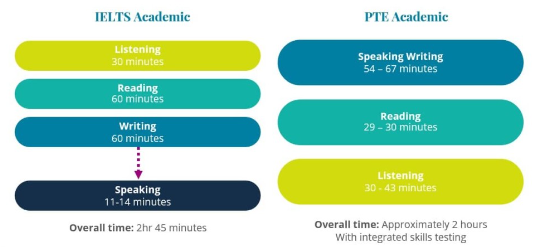
Image source: Pearson PTE
PTE – Overview
PTE, conducted by Pearson PLC, majorly relies on artificial intelligence (AI) based scoring system, because of which the process is unbiased and free from human prejudice, and also fast. The PTE is a tri-partite test comprising the following fragments – speaking and writing (together), listening, and reading.
If you take a PTE test for yourself, you will be scored on a scale of 10 to 90 points for both communicative skills (as mentioned above) and enabling skills. In addition, the overall score is also measured on a scale of 10 to 90 points.
IELTS – Overview
British Council, UK, the authority that conducts IELTS, has a renowned base of candidates, reviewers and assessors, that is responsible for manually evaluating the scores of applicants’ submissions.
The average overall band score, which is 0 to 9, is also the average of the scores allotted under the four parts of the test, which include listening, reading, writing, and speaking. A point worth noting, however, is that the scoring under IELTS is prone to human errors because of human-conducted manual evaluation.
What to choose? What to take?
Before we jump to analysing the specific details of both tests as we shared with you above, it is worth mentioning that the PTE results come out within five days and IELTS results take around 2 weeks. This means, PTE gives you faster, more accurate and advanced results, well-furnished with technological processes.
However, it is a well-known and well-established fact that the IELTS is a renowned and world-wide accepted test by different prestigious universities and institutions across many countries. That way, it is advisable that you can take both tests because they have different prospects that make them attractive individually, since they are both priced identically for registration purposes.
Criteria – Tick your boxes
The best way to make a choice at a higher level is to make multiple choices at the lower levels. We lay down a few criteria with differences to pick your choice and then choose your pick to go forward!
- Ease of Difficulty – Since both the tests are fragmented into similar sections of listening, reading and writing, and speaking, the choice can be made between whether you want to take up 3 sections (PTE) or 4 sections (IELTS).
- Mode of Speaking Test – PTE entails an online speaking test wherein one has to speak into the microphone to be assessed at a later stage in a computerised format. IELTS on the other hand, has a face-to-face interaction for the speaking test.
- Evaluation Mechanism – In PTE, the scoring and evaluation is based on artificial intelligence with negligible human interference and bias. In IELTS, the old-fashioned way of human-oriented evaluation is relied upon, thus prone to premonitions.
- Popularity and Acceptance – The PTE is not as popular as IELTS, when it comes to world-wide acceptance by institutions. It is IELTS that has a larger fan-base but again, is not everyone’s cup of tea.
- Immigration – The IELTS scores are considered for immigration applications but the PTE scores are generally not considered and welcomed.
The UK is rated highest for ease of the visa application process compared to all other study destinations
Visa processing bottlenecks worldwide have been leading to the UK benefitting from positive perception among education agents, research conducted in May has indicated.

For Canada and US, around 20% of respondents rated acceptance rates as “very good” and some 15% viewed them as “poor or very poor”
The UK appears to “be a league apart” compared with its other competitor study destinations, global education provider Navitas has said.
Among the 700 agents the company surveyed in May, 53% gave the UK the highest rating for ease of the visa application process, while Australia was a “distance second” at 32%.
Canada is ranked worst performing in all parameters the research surveyed apart from cost of applications. The questionnaire asked for perceptions around ease, acceptance rates, processing times and price.
The UK “stands to benefit from positive perceptions of its visa processing performance”, the report noted.
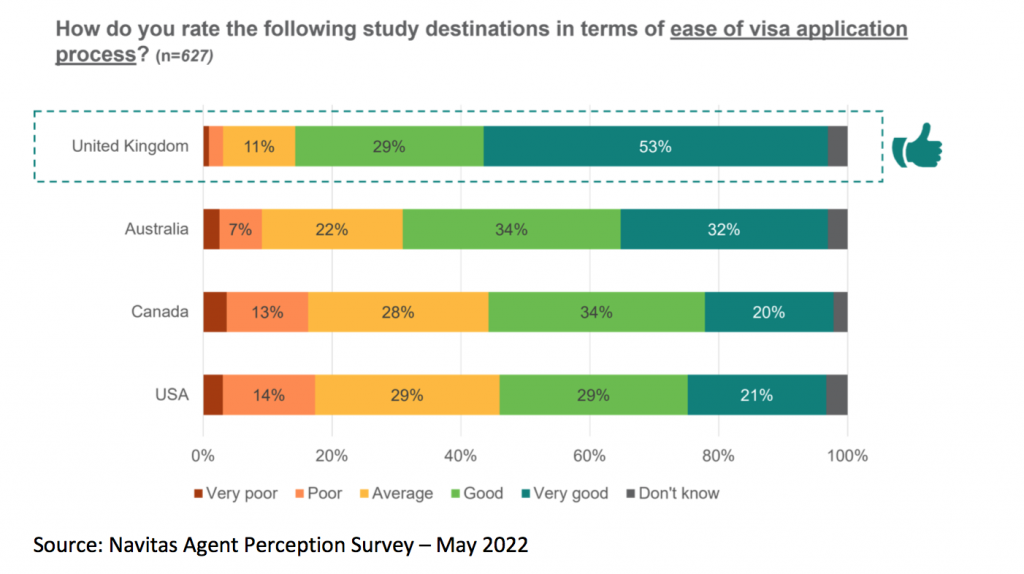
Agents also perceive the UK as having ‘very good’ visa acceptance rates, with 60% of respondents indicating so. The US and Canada fared far lower, with less than 20% saying acceptance rates were ‘very good’. A further 15% said they viewed US and Canadian acceptance rates as poor or very poor.
However, everything is not rosy for the UK with recent news reports suggesting the UK’s strong performance may have been “short-lived”. Since May, the UK has removed priority processing from some markets and there appears to be greater scrutiny of applications from ‘high-risk’ markets in the sub-continent and Nigeria, the paper suggested.
The paper also noted that agents in ‘high risk’ markets “generally express more negative perceptions of the visa process”, identifying those in South Asia and Sub-Saharan Africa as having stronger negative sentiments, specifically for Canada and the US.
“This poses a particular challenge for institutions looking to diversify the composition of their international student cohort by growing across the African continent,” Navitas said. Diversification has been a key theme in national agendas, including the UK, Australia, Canada and New Zealand.
The organisation also said that “processing time appears to be a more important factor than the cost of the application”.
Canada ranked low among destination countries as visa processing times.
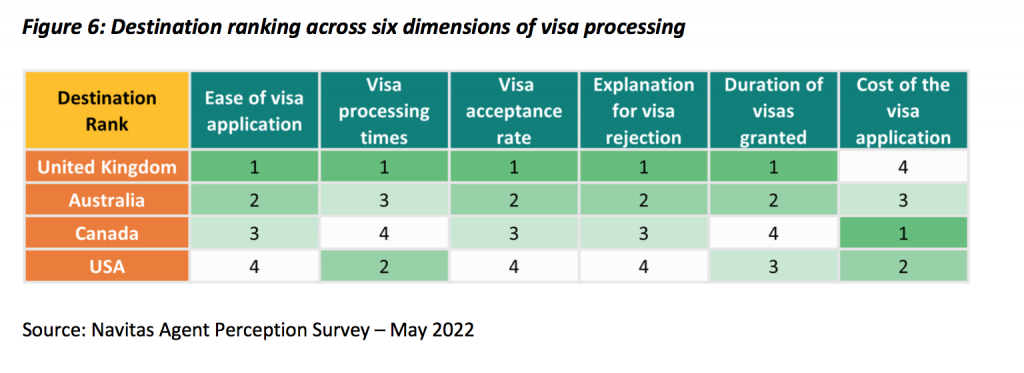
“Approximately 30% of agents from across the Americas, Greater China, South Asia, South East Asia and Sub-Saharan Africa rated Canada as Poor/Very Poor regarding Canada’s processing times,” the research found.
“Agents in China were perhaps the most negative with 36% of agents rating Canada as poor/very poor on processing times.”
“In 2021, Canada led the world in visa processing”
“In 2021, Canada led the world in visa processing with the introduction of the innovative, student-centric policy of a guaranteed turnaround time; students that applied for a study permit in May were promised a decision on their application by August, thereby giving students clarity for their ability to commence in the fall,” it concluded.
“In the coming months as international travel resumes, all destination countries will face increased difficulties when it comes to immigration processing, not just for international students but for other categories of applicants alike. Those destinations that can find ways to prioritise student visas at those critical pre-commencement windows will be able to maximise the momentum of the recovery.”
How to choose the right University abroad?
Make a decision!
Behind making a decision to study abroad, apart from childhood dreams and aspirations, there are many aspects that play an irreplaceable role. These include deciding upon the subject or discipline of interest, knowing the course of study, the fee structure of the course, employment prospects in the country chosen and the worldwide recognition of the degree to be received.
College vs. University
In the context of the United States, the terms ‘college’ and ‘university’ are mostly used interchangeably. In other countries like the UK and Australia too, they are treated the same at multi-levels, except that undergraduate courses are commonly found in colleges and post-graduate and doctorate courses in universities.
In fact, there are discipline-specific colleges in national universities, which is the most commonly found element of the higher education system in India as well. Therefore, generally it does not make a remarkable difference when choosing between a college or university as long as the course and country chosen is appropriate.
Step by Step…
In 4 simple steps, you can conveniently streamline the process of finding yourself the best place you can call your alma mater ten years down the line.
- Choose your subject – The first and foremost step before you jump onto more complicated selections like the country and the cost is to choose the discipline you want your specialisation degree to be in. Amidst others, law, medicine, technology, arts (including performing arts like dance and music) and architecture are the most commonly sought out areas of study internationally.
- Narrow down the courses – Once you’ve selected a subject, you can surf through the specific courses offered by different universities. The courses will have different kinds of curriculum and academic structure, from which you can choose what is best suited for your future expectations.
- Cost and Country of Study – When you have narrowed down the universities according to the subject and courses, filter them on the basis of the countries you wish to study in (on the basis of how student-friendly the visa rules are) and the cost of the course including the cost of living. The UK, US, Australia and countries in Europe are the best countries to study abroad. This is the trickiest part where education consultants like IOCL come to your rescue.
- Application process – The application process empanelled by the universities you have selected is also an area where you can seek help from consultants to choose the best pick. You can also prepare for various entrance examinations with their help.
There might be certain universities that might be the best but you need to choose what is right for you. What is the best might not be your perfect choice and thus, it is essential that you make the right decision.
Importance of Higher Education Overseas
Historical Background
In Europe, the concept of Higher Education found its genesis and many global universities came into being. Not just universities and colleges but higher education is also dispersed in multiple professional schools in diverse fields, including both conventional and non-conventional fields like science, law, business, medicine, finance, music and art.
Apart from direct educational and professional advantages of studying abroad through scholarships or otherwise, there is a gamut of positives that does not involve any academic angle.
Firstly, it is a first hand experience of living outside India, which helps students take their baby steps towards becoming independent.
Further, it also gives them an altogether different level of exposure and a huge amount of insight about educational standards and scholarships. From tackling changes and challenges, to settling in a foreign country, there are many experiences a student gets upon studying outside India.
One also gets to discover and learn about different cultures, ethnicities and rituals. This increases one’s ability to adapt to new surroundings and environment.

Higher Studies Abroad: Pros and Cons | Impel Overseas Consultants
Indian students and International Education: The trends
In India, the education sector has witnessed an upward trend in the number of students flying abroad for higher studies. While there are primary reasons like quality education, international career prospects, prestige, etc., there are many other peripheral incentives, which drive students to opt for different countries.
Amongst others, scholarships to study abroad are the driving force behind students choosing overseas graduation. There are both government and non-government scholarships like Fullbright scholarships and Tata Foundation and Birla Foundation scholarships, aiding students’ dreams to study abroad.
There are many consultants like Impel Overseas Consultants facilitating the cumbersome process of applications to such international universities, thus making the jobs of students easier and helping them grow.
Not only does overseas education help the students to learn a new language in most cases, they also develop a knack to impress employers owing to a totally different experience of classroom learning. In fact, the students also get a gateway to a huge caboodle of opportunities abroad itself with respect to job prospects and employment.
UOW ranks in the world’s top 200 universities
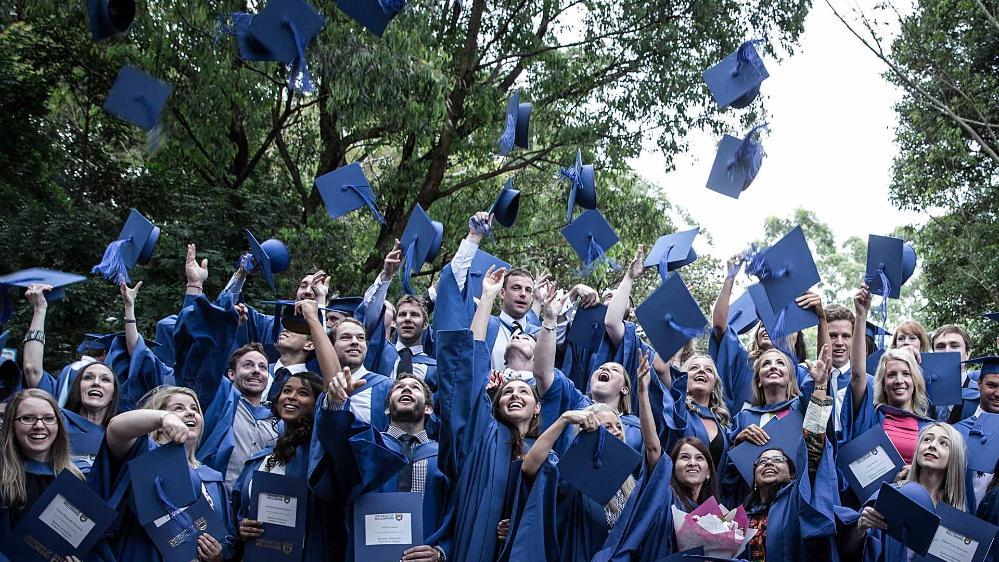
The University of Wollongong (UOW) has secured a spot in the world’s top 200 institutions in the 2021 QS World University Rankings released today, Wednesday 10 June, 2020.
UOW’s ranking has substantially improved from last year, jumping sixteen places to achieve an overall rank of 196th globally and 10th in Australia.
UOW competed with over1600 institutions globally, including 36 Australian institutions, and has jumped 87 places in six years due to its globally recognised research activities.
The ranking agency evaluates universities using six metrics: academic reputation, employer reputation, faculty to student ratio, citations per faculty member, and international faculty ratio, and international student ratio.
A marked improvement in citations per faculty member lifted UOW’s ranking in this metric a stunning 33 places to 75th globally and was the strongest contributor to the University taking its place in the top 200.
UOW Vice-Chancellor, Professor Paul Wellings CBE, welcomed the new rankings and said the University’s global approach to research partnerships and collaboration has underpinned this achievement.
“I am delighted to see our world-class research capabilities are making a global impact and these rankings recognise the efforts of our researchers through their strategic partnerships and collaborations.
“UOW research is dedicated to addressing real-world problems beyond the scope of a single discipline, in collaboration with industry, government and our wider communities.
“We should be proud that UOW is so highly ranked. Our long term investments in major research teams and the breadth of our academic work has driven the University forward,” Professor Wellings said.
In April, UOW also ranked 31st globally in the Times Higher Education Impact Rankings 2020 for successfully delivering the United Nations Sustainable Goals (SDG). SDGs are the backbone of UOW’s research strategy to tackle the world’s most pressing and complex challenges. Read the full story here.
Source: https://www.uow.edu.au/media/2020/uow-ranks-in-the-worlds-top-200-universities.php
South Asia study abroad interest remains high
A mere 2% of prospective students in South Asia would “totally drop” the idea of studying overseas due to the coronavirus pandemic, a survey by counselling organisation Global Reach has revealed.
Mirroring similar findings from a Yocket survey earlier this year, close to 70% of the 1,572 respondents indicated they still had an interest in studying abroad in the July-September 2020 cohort despite Covid-19.
Although 40% said they would wait to commence until the pandemic is over, some 25% of applicants would rather defer than cancel.
Respondents included individuals from India, Nepal, Bhutan, Bangladesh and Sri Lanka, with around 90% seeking to pursue postgraduate studies overseas.
Half of the respondents revealed they were interested in studying in Australia, followed by those opting for the UK or Canada.
“Student interest with studying overseas remain strong as planned while travel uncertainties loom large,” Global Reach said.
Travel restrictions and flight cancellations were a concern for 47%, while suspended visa processes were noted as a potential problem for 34%
Only 27% said they had health and safety concerns.
“Students’ concerns range from getting paperwork done and finances ready for application to job opportunities after course completion and stay back options thereafter,” Global Reach added.
“Close to 40% have expressed concern over not being able to embark on their study abroad journey as the visa centres are closed whereas about 30% are affected by their local university/school being closed, making it difficult for them to attain their transcripts for application processing.”
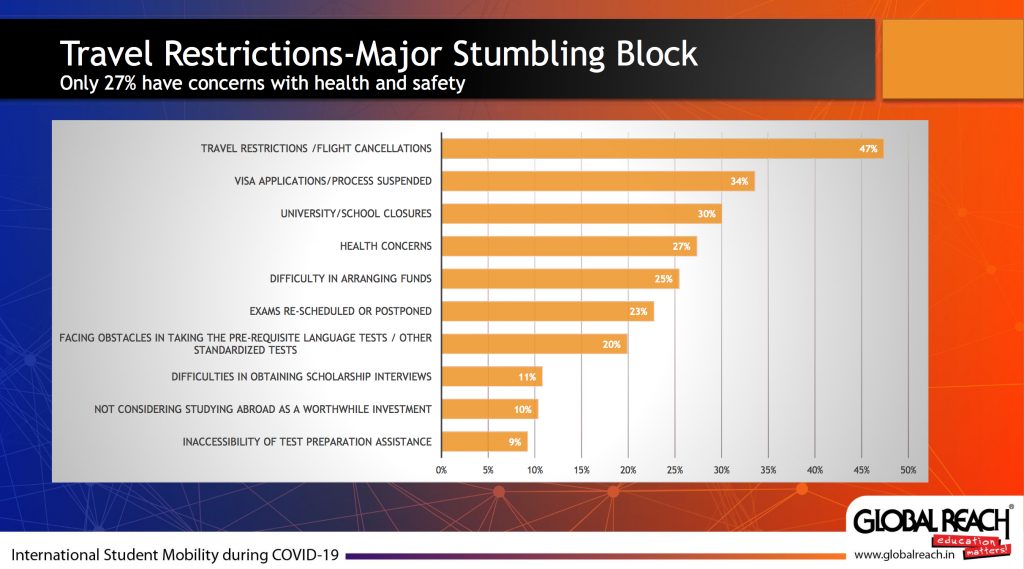
A quarter of students surveyed are open to online delivery, provided it is for one semester, and visa and post-study work rights are assured.
However, 50% said they were not interested in online delivery, with only 6% indicating they would be happy to pay the same price as on-campus education for off-campus remote delivered delivery.
“Basic face-to-face interactions and the experiences of on-campus lifestyle are key attractions to the scholars in the overseas education format,” Global Reach added.
Earlier this week, the UK government announced that international students would still be eligible to access the graduate immigration route as long as they are in the country by April 6, 2021, and complete the final semester of their studies in the UK.
Additionally, a Universities UK survey found that 97% of responding institutions will offer in-person teaching at the start of term.
A survey of 850 Indian students earlier this year revealed that 50% of students could consider deferring their study plans due to concerns about the impact of Covid-19 on jobs & salaries, and personal health.
Global Reach has recently launched its “renewed” online platform PSA to offer semi-virtual handling of the student counselling process through a GR trained counsellor. The three-year-old platform generated around 10% of total student enquiries in 2019.
“Our vision is to use technology as an enabler to support every student in their quest for international education,” said Ravi Lochan Singh, managing director of Global Reach.
Source: https://thepienews.com/news/south-asia-study-abroad-interest-remains-high-survey/
UK home secretary calls for post-study work restrictions to be lifted
UK home secretary Sajid Javid has called for prime minister Theresa May’s post-study work restrictions on international students to be lifted, arguing that the six-month limit undermines Britain’s universities and harms the country’s search for global talent.
In an article published by the Financial Times, Javid – a contender for the Conservative party leadership – said he backed a cross-party move to liberalise the student visa regime led by former universities minister Jo Johnson.
Javid’s intervention was welcomed by Johnson, who had tabled an amendment to the government’s Immigration Bill in April, calling for a two-year post-study work visa option for international students.
Prior to 2012, international students could stay and work in the UK for two years after graduation until May (then home secretary) began a clampdown on immigration, capping PSW time at four months.
As a result, the number of Indian students attending UK universities underwent a dramatic decline, from just under 30,000 in 2011-12 to just over 16,000 in 2016-17.
Earlier this year, the government accepted recommendations for PSW to be extended to six months for undergraduate and master’s students and a year for PhD students, however, some stakeholders argued that such a short extension was unlikely to “significantly increase interest”.
Writing in the FT, Javid said if he succeeded May as prime minister he would make Johnson’s clause for international students to have the right to stay on to work for two years “government policy”.
“It makes no sense to send some of the world’s brightest and most enterprising people straight home after their time here,” he wrote.
“So as prime minister I would make Mr Johnson’s plan government policy.
“I want to put skilled Britons in the same room as bright Europeans and those from other nations — in Manchester, Leeds and London, not Paris or Stockholm,” he added.
Javid’s comments received widespread support within the sector, with UKCISAchief executive Anne Marie Graham describing them as “a tremendous step forward for international students in the UK”.
“[It] will contribute to the successful delivery of the International Education Strategy. I’m very grateful to Jo Johnson and Paul Blomfield for their work to achieve cross-party support for this important amendment,” she said in a statement.
Nick Hillman, director of the Higher Education Policy Institute added: “This is fantastic news. The home secretary has seen, not least during his time as business secretary, how much harm the current rules are doing.”
An analysis published earlier in 2019 revealed the UK’s limitations on PSW cost the treasury £150 million each year in foregone receipts, amounting to just over £1bn since the restrictions were introduced in 2012.
Chief executive of Universities UK Alistair Jarvis said such a change in policy would “correct a longstanding policy barrier to growth in international student numbers”.
“Growth in international enrolments in the UK has stagnated compared to our competitors, largely due to the uncompetitive visa offer,” he said.
“This must change if we are to…remain a leading destination for overseas talent.”
